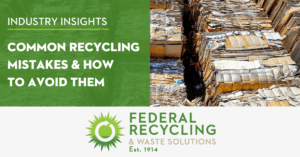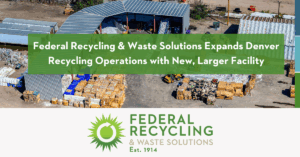With increasing consumer demands for sustainable products and responsible business practices, sustainability in business is as important now as it’s ever been. According to the United Nations Global Compact-Accenture 2023 CEO study, 98% of CEOs believe sustainability should be an integral part of business.
Businesses are constantly evaluating their sustainability strategies and ways they can do better. Commercial recycling, where businesses collect and sort their waste for pickup by commercial recycling companies who process recyclable commodities for resale and reuse, is an easy and cost-effective program to implement that reduces waste and environmental impact.
3 Reasons to Have a Commercial Recycling Program
Create New Revenue Streams & Cost Savings
Investing in a commercial recycling program isn’t just good for the environment — it’s good for business. Companies can use recycling income and waste disposal cost savings to improve their bottom line or invest in other areas of their business, all while reducing landfill waste and contributing to a more sustainable future.
Businesses that don’t recycle end up paying for waste removal when they could earn income for their recyclables. Commercial recycling programs enable businesses to create revenue streams by selling their recyclable commodities for further resale to manufacturers in need of recycled raw materials. Recycling also helps lower waste disposal fees. Commercial recycling diverts recyclables with the right onsite equipment, such as commercial recycling bins and containers, compactors or balers, and efficient waste hauling schedules with no overspend due to too frequent pickups.
Businesses with sustainable practices, including commercial recycling programs, can also save by qualifying for state or federal tax credits, rebates, sales tax exemptions, or other incentives.
Increase Customer Trust
PwC’s 2024 Voice of the Consumer Survey showed that more than 80% of consumers are willing to pay more for sustainably produced or sourced goods, and that consumers are assessing producers’ sustainability practices, including recycling. Companies that recycle can significantly elevate customer trust and brand reputation, demonstrating their direct commitment to sustainable business practices. Companies with a strong commercial recycling program can also expand their customer base and revenue by attracting new companies or consumers who value sustainability.
Another report from Bain & Company highlights the growing importance of recycled packaging and the recyclability of packaging in consumers’ perceptions of sustainability. Companies that prioritize product recyclability and the creation of closed loop recycling systems can meet consumer demands while also realizing potential operational cost savings from simplified design and use of recycled materials.
Reduce Overconsumption & Energy Usage
Commercial recycling programs combat the “take-make-waste” linear economy that can cause environmental degradation and harm. Companies support the circular economy by recycling their byproducts for reuse in the supply chain. Product manufacturing from new raw resources is often the most energy-intensive and pollutive part of a product’s life.
Recycling and reusing materials such as paper, cardboard, metals, plastic, and pallets saves considerably more energy than producing virgin raw materials. For example:
- Recycling aluminum saves up to 95% of the energy needed to produce new aluminum.
- Recycling paper products reduces energy use by 60% compared to virgin paper production.
Businesses that reclaim their own manufacturing waste through closed loop recycling can save on energy and material costs, reduce their carbon footprint with less emissions, and help eliminate waste to shrink the footprint of landfills, where waste sometimes takes decades or centuries to decompose. They can also create a competitive advantage through product design innovation, enhanced product functionality, and faster regulatory readiness.
Dell Technologies is an example of a company leading the way in closed loop recycling. Since 2007, the company has recycled over 2.8B pounds of used electronics into sustainable PCs. In partnership with Intel, Dell has developed unique sustainability services and products to help companies manage and extend the lifecycle of their electronics, lower operating costs, and reduce emissions with more efficient devices.
Reap the Benefits of a Recycling Program in 2025
Having a commercial recycling program creates measurable benefits. It can:
- generate new revenue and reduce costs
- build stronger customer trust through visible sustainability efforts
- shrink overconsumption and energy usage by keeping materials in circulation
These three advantages, along with regulatory compliance, employee engagement and more, make a compelling case for recycling in terms of business value and environmental responsibility.
How Federal Recycling can help with Commercial Recycling
At Federal Recycling, we’ve been recycling for 100+ years, giving companies the most competitive pricing for their recyclable materials. We are a materials recycling company for cardboard, paper, plastic, pallets, ferrous and nonferrous metal, foam, food waste, glass and more. At no cost or obligation, we audit companies’ waste streams, review current material pricing, and offer suggestions and recycling best practices for maximizing or starting your commercial recycling program.
For more information on how Federal Recycling can support your commercial recycling needs, contact us today.



